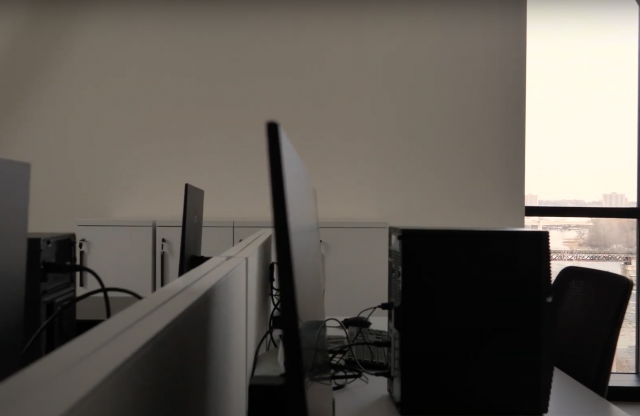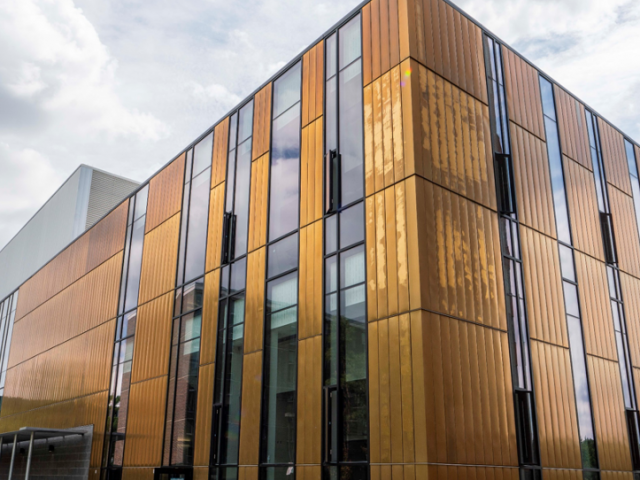Partnership
Carleton and General Dynamics have established a research partnership to engage collaborative research projects through the Cyber Reference Lab- a State-of-the-art workspace located in Carleton’s ARISE (Advanced Research and Innovation in Smart Environments) Building. The dedicated space has been fitted with enterprise servers, security appliances, hardware firewalls, router switches and workstations that look to simulate networks to enhance, design, develop and test new cyber capabilities.
The Cyber Reference Lab aims to foster collaborative cyber research and innovation between government, researchers, students and industry partners. This workspace gives students the opportunity to work hands on with state-of-the-art technology, guided by industry experts, working from low-level operating system functionality to high-level security protocol.
This partnership embodies what collaboration with Carleton represents and serves as a mutually beneficial relationship with the intention of advancing facilities and programs within Carleton, strengthen cyber security measures through collaborative research projects, and propel the industry through a combined effort to strengthen its future workforce.
“Each year the number and severity of cyberattacks grow, affecting all aspects of society. By creating an environment to test network virtualization under harsh conditions via simulations such as network load, wireless interference, power disruptions, etc. we will enhance network security, reliability and scalability.”
Rafik Goubran, Carleton vice-president (Research and International).
General Dynamics Announces Launch of Cyber Reference Lab at Carleton University

Shared Goals
- Accelerate promising research/innovation
- Generate new opportunities for collaboration
- Provide experiential learning opportunities for students
- Engage industry, government and community partners
- Co-create novel solutions to improve the quality of cyber security

Impact
Engineers from General Dynamics will work with students in a mentoring capacity, providing expertise and access to additional technical experts, and in selecting and supporting research topics to align with emerging industry needs. As projects progress and problems are identified, new spin off projects are initiated.
Within the lab, undergrad and doctoral students are exploring ways to use AI and machine learning to reduce the cognitive load on those at the front lines of cyber security and accelerate their decision-making capabilities.
Cyber security, reliability and scalability are an area of high concern as the globe has become more reliant on network technology. A transition that has recently accelerated in wake of the covid-19 pandemic. This collaborative effort looks to explore new technologies that ensure Canadians can avoid any threats within an increasingly vulnerable cyber space
The partnership between Carleton University and General Dynamics Mission Systems–Canada for the Cyber Reference Lab, and the work the students will do there, will help protect Canadians from cyber threats and ensure they can safely enjoy the benefits of the digital world.
François-Philippe Champagne, Minister of Innovation, Science and Industry
General Dynamics Canada

Objectives
- Establish a Cyber reference lab at the University using a combination of FOSS and COTS components, including routers, switches, servers, wireless nodes, firewall, traffic generators, etc.
- Create an environment to facilitate testing in the field of network virtualization allowing for the optimization of infrastructure, including virtualizing network appliances, segregating networks, and scaling without having to procure additional networking equipment.
- Develop, implement and test advanced security schemes to improve the reliability and QoS of next generation networks, including authentication, encryption, IDS with machine learning and artificial intelligence, etc.
- Provide a testbed for multiple use tools such as cyber-attack simulation including both
automated and manual techniques, and to test under the harshest of conditions via DIL
simulations, including network load, wireless interference, power disruptions, and managing wireless/RF loss without the risk of exposure to operational data or assets. - Study and analyze the risks and cyber-security vulnerabilities associated with next generation networks. Examine existing countermeasures, and explore the limitations of these methods.
- Allow for Sponsor engineering, development, testing and demonstrations to Sponsor’s
customers and suppliers in an unclassified environment.

Richard Yu, Principle Investigator
Cyber Reference Lab

The Cyber Reference Lab aims to foster collaborative cyber research and innovation between government, researchers, students and industry partners.
Research Projects
- Advanced Signal Processing
- Multi-Camera Calibration and Stitching Under Automated Scenarios
- Message Passing Middleware Evaluation

Arise Building

The Advanced Research and Innovation in Smart Environments (ARISE) houses the Cyber Reference Lab, a state-of-the-art laboratory dedicated to cyber security.
